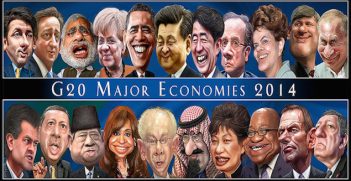UN Rebuffs Netanyahu and Trump

The United Nations Security Council’s pre-Christmas condemnation of Israel’s construction of settlements in the occupied territories surprised many and infuriated Israel. The move was a rebuff to both Israel’s Prime Minister Benjamin Netanyahu and to incoming US President-elect Donald Trump. How did it happen? And what will be the likely ramifications?
The United Nations has a curiously ambivalent history with Israel. On the one hand, the UN’s human rights machinery in Geneva has had an obsessive focus on alleged Israeli infractions of international human rights and humanitarian laws. Many of the judgments coming out from there are hard to take seriously when one looks at the human rights practices of many sitting in judgment on Israel.
In New York too, the General Assembly majority has often been hostile to Israel and this culminated in the shameful Resolution 3379 (10 November 1975) equating Zionism with racism. The resolution was revoked by Resolution 46/86 (16 December 1991) after the Cold War ended.
On the other hand, Israel’s birth as a state for the Jews was given international legitimacy by the UN whose long-favoured two-state solution calls for a secure and legitimate Israel alongside a Palestinian state. No other country has had so many draft resolutions critical of it vetoed by a permanent member, with the US having done so scores of times; and no other country matches Israel’s record of defiance of UN resolutions.
Perhaps this explains Israel’s hubris. If so, it got a sharp jolt.
Resolution 2334
On 23 December, the UN Security Council (UNSC) adopted Resolution 2334 by a vote of 14-0. By abstaining, the US chose not to veto the resolution’s criticism of unchecked Israeli settlements policy in occupied lands.
The international consensus may be summarised thus:
- Israeli settlements in occupied territories are illegal;
- They amount to creeping annexation;
- They have progressively nullified the viability of a two-state solution to the Israeli–Palestinian conflict to which the world has been committed for decades.
Resolution 2334 does little more than restate the existing consensus. This makes Israel’s fury all the more petulant. Its co-sponsors were New Zealand, Senegal, Malaysia and Venezuela. Israel does not have diplomatic relations with the latter two. It withdrew ambassadors from the first two and terminated aid to Senegal.
The episode also dramatised Egypt’s diplomatic dilemma: rhetorical solidarity with the Palestinians but financial dependence on US assistance (over US$1 billion dollars annual aid) and a de facto security partnership with Israel in the Sinai and against Hamas in Gaza. Having been the original sponsor of the resolution, Egypt withdrew it under pressure from Netanyahu and Donald Trump.
According to Haaretz, a leading Israeli newspaper, Israel’s Prime Minister Benjamin Netanyahu phoned NZ Foreign Minister Murray McCully to warn him that co-sponsorship of and a vote for the resolution would “be a declaration of war … and there will be consequences”. Plucky NZ stuck to its guns, with McCully explaining that the resolution conformed to NZ’s long-standing policy on the Palestinian question and its belief that the UNSC should be doing more to support the Middle East peace process.
A column in Haaretz observed: “a country that declares war on members of the Security Council is either a superpower or a joke. And Israel … isn’t a superpower”. Netanyahu’s reactions show him to be “out of control”. It takes rare skill to make an enemy of NZ.
There are two additional curiosities in this episode. Violating diplomatic etiquette, US President-elect Donald Trump inserted himself into active global diplomacy against the policy of the incumbent president. As such Resolution 2334 marks a diplomatic rebuff to Trump. He might well be the only American president to have suffered a diplomatic defeat before taking office. It could prove a telling portent of the new administration’s troubles ahead in world affairs.
Second, Netanyahu described the US conduct as “a shameful ambush at the UN“. What is really shameful in US–Israel relations is the extent to which Washington subordinates its broader, long-term, global interests to Israel. Last year former Israeli prime ministers Ehud Barak and Ehud Olmert warned Israel risks becoming an apartheid state. Israeli intransigence on settlements had already lost much European goodwill and support. Netanyahu did everything possible to lose US support as well.
On 3 March 2015, Washington witnessed astonishing political theatre. In a vain bid to kill the impending Iran nuclear deal, Netanyahu addressed a joint sitting of Congress in a direct attack on Obama. The transcript of the speech – also available on YouTube – notes 43 instances of applause in the 43-minute address. The Republican Party that prides itself on being more patriotic than the Democrats produced the spectacle of genuflecting to a foreign leader who used his podium in the US Congress to criticise the sitting US president. The rest of the world shook its head in collective disbelief.
Trump’s role
Netanyahu’s office has said Israel will work with Trump and Democratic and Republican friends in Congress “to negate the harmful effects of this absurd resolution”. The UNSC may have decided to proceed with the resolution now partly motivated by the thought that no resolution critical of Israel would be entertained by the Trump administration. His choice of ambassador to Israel, David Friedman, has described Jewish-American supporters of a two-state solution as worse than the Jews who turned in fellow-Jews in Nazi death camps (‘kapos’) because the latter had acted under extraordinary duress and cruelty.
A consummate deal maker, Trump will be required to come to terms with the reality of needing UN authorisation for some core US goals with China, Russia and others as permanent UNSC members. He will need broader coalitions to pursue many US goals and these will be harder to build if he unilaterally breaks the broad international consensus on the settlements.
In his wider Middle East policy, Trump has promised to elevate order and stability above the promotion of democracy and human rights, an end to regime change and overthrowing governments, and a willingness to work with other countries on shared interests. If implemented, this would mark a departure from both the Obama and Bush administrations and signal a transactional approach to foreign policy where the vast panoply of diplomatic tools at the US disposal are utilised to close deals on issues to hand.
But often in international diplomacy, relationships are transactional, not just specific deals. Will Trump dismantle the nuclear deal with Iran and jeopardise his incipient partnership with Russia’s President Vladimir Putin to defeat Islamic State? Will he move closer to Taiwan and undermine China’s cooperation in checking North Korea’s nuclear ambitions?
Resolution 2334’s impact is largely symbolic. Washington will not permit any enforcement action against Israel for ignoring and violating it. Even so, the world has passed judgment – with exceptional clarity, breadth and depth – that Israel’s expanding settlements policy is wrong: legally, morally, politically and for Israel’s own future and security. It registers the international community’s judgment that the settlements are illegal, highlights Israel’s growing isolation as a recalcitrant UN member state, and throws down the gauntlet for the incoming Trump administration’s engagement with the world body.
Ramesh Thakur, a former United Nations assistant secretary-general, is professor in the Crawford School of Public Policy, Australian National University.
This article is published under a Creative Commons Licence and may be republished with attribution.





